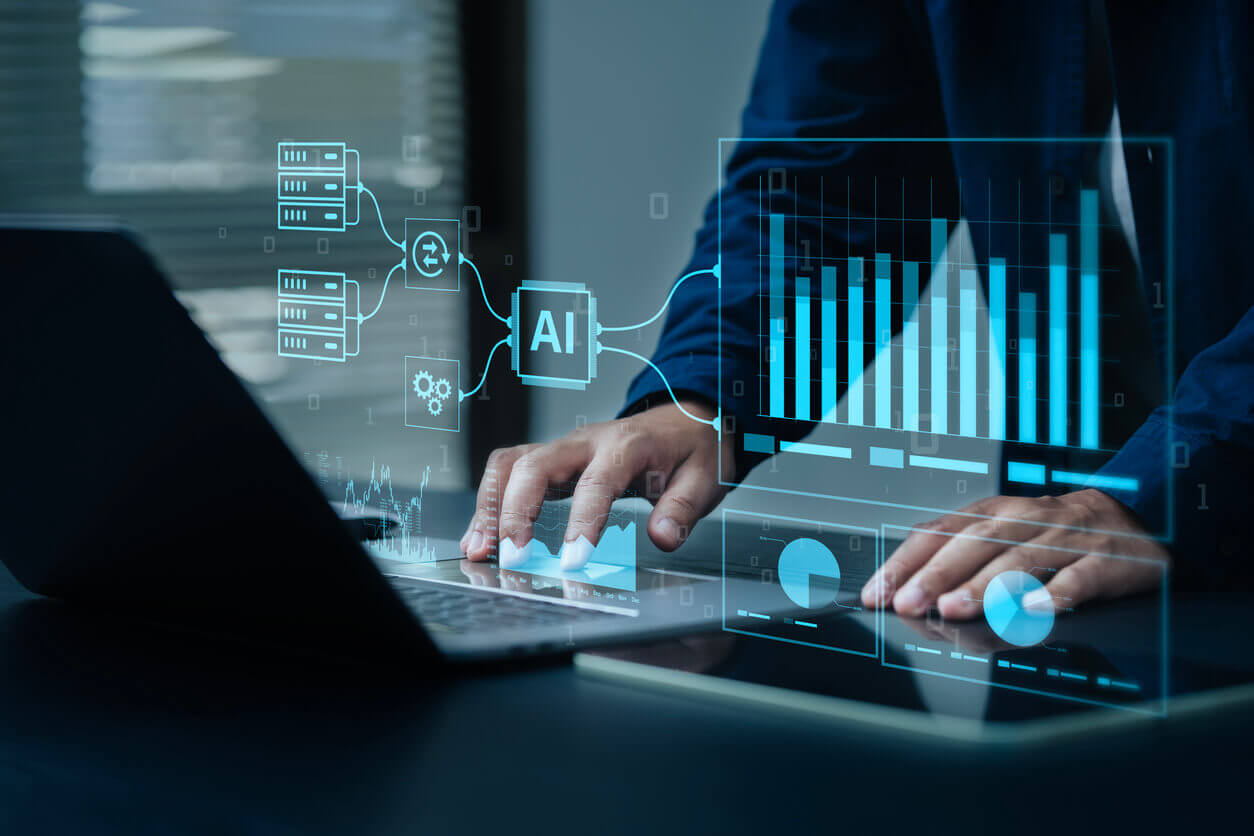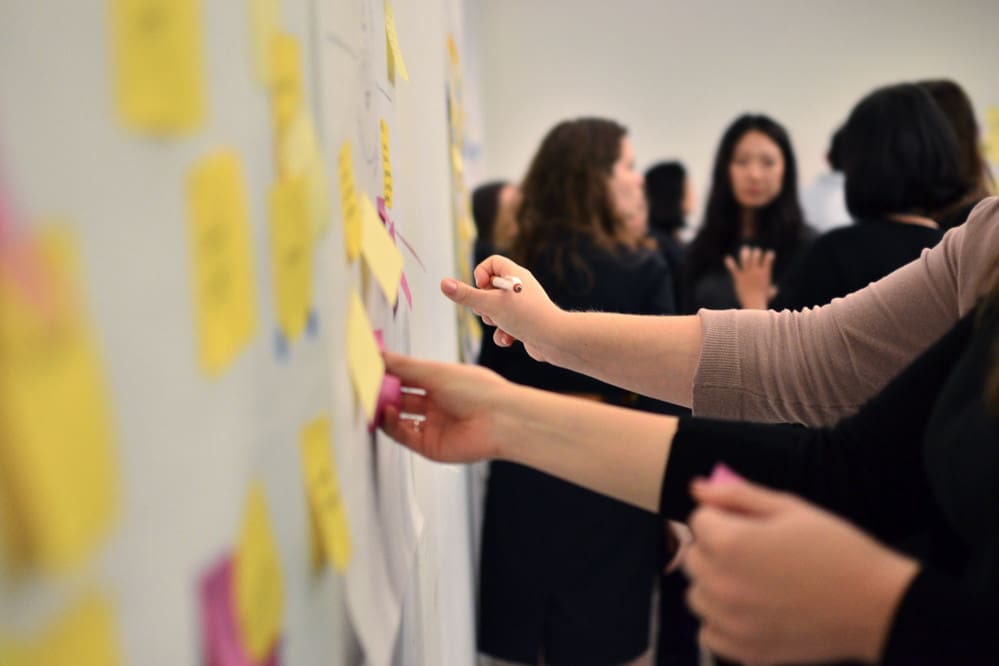
Compare Providers
Download our outplacement comparison sheet
Request Pricing
Compare our rates to other providers
Artificial intelligence (AI) is no longer a futuristic concept; it’s a workplace reality. As we celebrate International HR Day, it’s essential to spotlight the role of HR professionals in navigating one of today’s most pressing challenges: AI taking over jobs.
While automation can increase efficiency, it also prompts critical ethical concerns. How is AI taking over jobs? What roles are and aren’t at risk? And how can organizations support displaced workers compassionately and proactively?
This article explores how Ai is taking over jobs, what jobs cannot be replaced by AI, and what HR must do about it.
Is AI Really Replacing Jobs?
The question, “Is AI taking over jobs?” is no longer speculative. The World Economic Forum (WEF) reports that AI and automation could displace 85 million jobs by 2025, but also create 97 million new roles more aligned with the division of labor between humans, machines, and algorithms. This shift represents not just a disruption, but a transformation where routine, predictable tasks are being automated and human-centric roles are evolving.
According to McKinsey & Company’s 2024 State of AI report, approximately 25 percent of current work tasks globally could be automated with existing technology. The impact is especially visible in roles involving structured, repetitive tasks such as data entry, basic bookkeeping, and customer support.
Furthermore, a 2023 Goldman Sachs study suggested that generative AI alone could impact up to 300 million full-time jobs globally, including high-skill sectors such as law, media, and finance. The AI revolution is not only a blue-collar concern, it’s reshaping white-collar work too.
What Jobs Is AI Taking Over?
As AI continues to evolve, it’s not just replacing repetitive tasks, but also outperforming humans in many areas due to speed, scalability, and cost-effectiveness.
Here’s a deeper look at what jobs are most in danger from AI, and why AI is gaining the upper hand:
1. Administrative and Office Support
AI tools now handle tasks such as data entry, calendar management, scheduling, expense tracking, and email drafting. These functions have traditionally been assigned to administrative professionals like office assistants, payroll clerks, and executive secretaries.
Why AI is doing it better:
- Accuracy: AI algorithms can process large volumes of data without the fatigue or human error common in repetitive tasks.
- Speed: What might take a human hours to input or organize can be completed by AI in seconds.
- Cost: Once implemented, AI systems like Microsoft Copilot or X.AI reduce the need for full-time administrative headcount.
2. Customer Service
AI-powered chatbots and virtual assistants are now capable of handling most customer inquiries without human intervention. Tools like Zendesk’s AI Suite and IBM Watson have significantly improved resolution times for routine queries.
Companies like Bank of America (with its AI assistant, “Erica,” its AI assistant) and H&M use these tools to reduce the size of their customer service departments while improving service efficiency.
Why AI is doing it better:
- 24/7 Availability: Unlike human teams, AI doesn’t sleep or require breaks, making it ideal for global or around-the-clock support.
- Consistency: AI provides standardized responses that eliminate tone issues, emotional variability, or escalation delays.
- Scalability: AI can handle thousands of conversations at once, something human teams cannot match without massive hiring.
3. Manufacturing and Warehousing
In sectors like auto production or e-commerce, robotic arms and AI-powered logistics systems are revolutionizing workflows. Amazon, for example, uses a combination of robotics and AI to pick, pack, and route items faster than human teams.
Why AI is doing it better:
- Precision: Robotic systems execute tasks with microscopic accuracy, reducing waste and error rates.
- Endurance: Machines can work 24/7 without fatigue, significantly increasing output.
- Safety: Dangerous tasks (e.g., handling heavy loads or working with hazardous materials) are better managed by robots, improving workplace safety.
4. Transportation and Delivery
AI is increasingly used in autonomous vehicles, route optimization software, and delivery drones. Companies like Tesla, Waymo, and FedEx are investing heavily in self-driving technology.
Why AI is doing it better:
- Efficiency: AI-based routing tools can reduce delivery times and fuel consumption by calculating optimal paths in real time.
- Automation potential: Long-haul trucking and last-mile delivery are prime candidates for automation, especially with labor shortages.
- Reduced human error: Autonomous systems are not prone to the drowsiness, distraction, or decision fatigue that are key contributors to traffic accidents.
5. Retail and Hospitality
From self-checkout machines to AI-powered booking systems, automation is changing how people shop and travel. Grocery stores, airports, and hotels are integrating AI to manage everything from inventory to guest services. Also in hotels, AI concierge bots, facial recognition check-in, and robot-cleaners are being tested to offset labor shortages and rising operational costs.
Why AI is doing it better:
- Convenience: Self-checkout kiosks can serve more customers in less time without waiting for a cashier.
- Personalization: AI uses customer data to make tailored recommendations, increasing conversion rates.
- Operational efficiency: Smart inventory tools reduce stockouts and over-ordering, which saves costs and improves customer experience.
6. Media and Content Generation
Tools like ChatGPT, Jasper, and Midjourney can generate articles, ads, visuals, and videos in minutes. While AI may lack the emotional nuance and originality of a skilled human creator, and still require human oversight, content creation is rapidly becoming a human-AI hybrid that’s already replacing junior copywriters, video editors, and graphic designers in many organizations.
Why AI is doing it better:
- Speed: AI can generate thousands of words or image concepts in seconds, cutting creative development time drastically.
- Volume: AI enables content marketing teams to scale production without needing to expand headcount.
- Optimization: AI can A/B test variations of copy or creative based on real-time engagement data, improving performance.
If you need help guiding your workforce through these AI disruptions and job replacements, click below to speak with our experts and see how our Careerminds career development and outplacement services can help.
What Jobs Cannot Be Replaced By AI (for Now)?
While AI has undoubtedly made strides in replacing certain types of work, its capabilities are still limited in some essential human domains. AI excels at repetitive tasks, pattern recognition, and processing large datasets, but it struggles with complex human emotions, ethical reasoning, and creative thinking.
Below are some key jobs that are far less likely to be fully automated any time soon:
1. Healthcare Providers (Nurses, Therapists, Physicians)
In healthcare, AI tools can assist with diagnostics, treatment planning, and even robotic surgery, but they still cannot replace the empathy, human touch, and critical thinking skills that are essential in patient care.
Why humans are better suited for these jobs:
- Empathy and compassion: Nurses and therapists build relationships with patients, offering emotional support that is crucial to recovery. AI can’t provide the comforting presence that a human caregiver offers, particularly in stressful or emotionally intense situations.
- Complex issues: While AI can process vast amounts of data, healthcare decisions often involve ethical dilemmas, judgment calls, and considerations of a patient’s personal values. Physicians must balance evidence with human factors, which is a deeply nuanced process.
- Trust: Medical professionals are trusted figures who communicate complex medical information in a way that is accessible and compassionate. This is an essential part of the healing process and something AI can’t replicate.
2. Creative Professionals (Writers, Designers, Filmmakers)
AI tools like ChatGPT and MidJourney are great at generating content, but creativity involves far more than producing words or images that fit certain patterns or criteria. Creative professionals bring unique insights, perspectives, and emotional depth to their work.
Why humans are better suited for these jobs:
- Imagination: While AI can mimic styles or generate content based on existing data, true creativity comes from personal experience, culture, and emotional depth. Human creators can come up with entirely new concepts and innovative solutions that go beyond algorithmic predictions.
- Cultural sensitivity: Creative work often reflects societal trends, personal beliefs, and cultural nuances. Human creators have the ability to understand and interpret these elements in ways that AI, lacking a lived experience, cannot.
- Emotional resonance: The best art, writing, and design evoke emotional responses. A writer’s voice, a filmmaker’s vision, or a designer’s aesthetic sensibility can connect with people on a deeply emotional level.
3. Educators (Early Childhood and Special Education)
While AI can assist with educational tools and online learning platforms, it is far from capable of replacing the role of a human teacher, especially those in early childhood and special education, where emotional intelligence and individualized instruction are crucial.
Why humans are better suited for these jobs:
- Personalized learning: Educators tailor lessons to each student’s learning style, pace, and needs. This individualized attention is essential for students with diverse needs, particularly in special education, where human interaction is key to their development.
- Emotional support: Teachers act as mentors, offering emotional and psychological support to students. This is especially important for children and those with learning challenges. AI lacks the emotional intelligence to understand and address these needs.
- Social and moral development: Teachers instill values, social skills, and ethics in their students with lessons that go beyond academics. These types of interpersonal interactions are impossible for AI to replicate, as they require the ability to model human behavior and connect with others on a personal level.
4. Skilled Tradespeople (Electricians, Plumbers, HVAC Technicians)
The work of skilled tradespeople is hands-on and highly variable, requiring a deep understanding of materials, environments, and complex problem solving. AI and robots may assist with certain tasks, but they will not replace the need for human expertise in this area.
Why humans are better suited for these jobs:
- Troubleshooting: Skilled trades often involve troubleshooting unique, site-specific challenges. For example, when an HVAC system breaks down or a plumbing issue arises, the solution may not be immediately obvious. These jobs require a blend of technical knowledge, experience, and adaptability.
- Physical dexterity: Tradespeople must work in diverse, often unpredictable environments. Tasks may require physical dexterity and the ability to use tools in real-time situations, something that robots or AI systems find difficult to manage in dynamic or cramped spaces.
- Human judgment: Tradespeople frequently need to make judgment calls about the best course of action, particularly in non-standard situations. This requires practical knowledge and experience, which AI systems cannot yet replicate, even with sophisticated algorithms.
5. Human Resources and Organizational Development Leaders
While AI can assist with resume screening, data analysis, and talent management, it is not equipped to handle the interpersonal dynamics that HR and OD leaders manage daily. Human decision making, emotional intelligence, and cultural awareness are crucial in these roles.
Why humans are better suited for these jobs:
- Human emotions: HR leaders deal with complex, sensitive issues, such as conflict resolution, employee well-being, and career development. Emotional intelligence is necessary to understand the nuances of human behavior and make thoughtful, fair decisions.
- Cultural sensitivity: HR and OD leaders play a critical role in shaping an organization’s culture. This involves understanding and fostering interpersonal relationships, ensuring diversity, and resolving conflicts. AI lacks the nuance to navigate these complex, evolving dynamics.
- Ethical decision-making: Many HR decisions involve ethics and fairness. For example, decisions regarding hiring, promotions, and disciplinary actions require a deep understanding of organizational values, legal frameworks, and human rights—areas in which human judgment is paramount.
How Will AI Reshape the Workforce Long-Term?
By 2050, AI is projected to influence nearly every sector. The pace of adoption will vary by industry, regulation, and regional economic development. What’s clear is that the question is no longer, “Will AI take over jobs?”, but rather, “How do we prepare for the new world of work?”
That said, this story isn’t just about elimination. While AI will phase out certain jobs, it will also create entirely new categories of work, many of which didn’t exist a decade ago and are still evolving.
Here are four emerging roles gaining traction as we prepare for the next phase of the AI-powered economy:
1. AI Ethicists
- What they do: AI ethicists are professionals who guide the development and deployment of AI systems to ensure that they are aligned with ethical principles, such as fairness, accountability, privacy, and transparency.
- Why they matter: AI systems often reflect the biases of their creators or training data. An AI ethicist examines how algorithms impact society, especially marginalized groups, and advocates for inclusive design practices. With governments and consumers calling for more responsible AI, this role will become increasingly important.
- Industries hiring them: Tech companies (e.g., Microsoft, Google), governments, think tanks, and NGOs focused on digital rights.
2. Prompt Engineers
- What they do: Prompt engineers specialize in crafting effective inputs or “prompts” to get the best outputs from AI systems like ChatGPT, Claude, and image generators like Midjourney or DALL·E.
- Why they matter: As AI becomes more powerful, how you ask it to do something can drastically change the result. Prompt engineers are part linguist, part technologist, and part creative strategist, bridging the gap between human intention and machine execution.
- Industries hiring them: Marketing, media, education, gaming, product development, and AI research.
3. Digital Well-Being Coaches
- What they do: These professionals help individuals and teams establish healthier relationships with technology. They design personalized strategies to prevent digital burnout, manage screen time, and build mindful tech habits.
- Why they matter: As AI and digital tools infiltrate every aspect of our lives, maintaining mental health and preventing tech overload has become a new priority. Digital well-being coaches act like health coaches, but for our digital lives.
- Industries hiring them: Corporate HR departments, wellness companies, healthcare providers, and tech-forward coaching platforms.
4. Human-AI Interaction Designers
- What they do: These designers craft the interfaces and experiences through which humans interact with AI. Their focus is on usability, accessibility, and ensuring that users feel empowered, not confused or manipulated, when using AI tools.
- Why they matter: Good AI design is invisible. If people don’t trust or understand an AI system, they won’t use it. Human-AI interaction designers help create seamless experiences that combine user needs with AI capabilities.
- Industries hiring them: Tech firms, product development teams, UX agencies, and healthcare or fintech platforms that are integrating AI into daily tools.
How to Handle AI-Driven Workforce Shrinkage
This is where HR steps in. As organizations deploy AI, HR professionals must ensure that career transitions are handled with transparency, fairness, and foresight.
Here are five core ethical practices that HR can implement:
1. Transparent Communication
Employees should never be blindsided by automation and any resulting job redesigns, reassignments, or reductions. Clear, ongoing communication builds trust and prepares workers for what’s next.
2. Proactive Career Transition Support
Ethical layoffs should include severance, outplacement services, and access to career coaching. HR can partner with external firms or provide internal resources to help affected employees pivot successfully.
3. Reskilling and Upskilling Programs
Rather than resisting the inevitable shift, employers and HR leaders should invest in reskilling programs to help displaced workers move into AI-adjacent roles. For example:
- A customer service agent could upskill into a chatbot training specialist.
- A warehouse worker might train to operate and maintain AI-powered machines.
- A journalist could pivot into an AI-assisted content strategist.
4. Bias Auditing in AI Tools
Using AI in hiring, performance evaluation, or workforce analytics requires careful oversight. HR should be routinely auditing algorithms for bias and ensuring compliance with DEI values and legal standards.
5. Hybrid Job Design
Rather than replacing people entirely, AI should augment human roles. For example, recruiters can use AI to source resumes, but then rely on their human intuition and emotional intelligence to make final hiring decisions.
AI Taking Over Jobs: Case Studies
As AI adoption grows, the good news is that HR teams don’t have to start from scratch. There are valuable lessons you can draw from other organizations that are already navigating these shifts.
Below are three case studies that show what ethical and effective AI-era transitions look like in practice. These examples demonstrate that ethical transitions aren’t just possible, but also profitable, future-proof, and reputation-enhancing.
AT&T
Anticipating major tech shifts, AT&T launched a $1 billion reskilling initiative to retrain nearly 100,000 employees for roles in cybersecurity, software engineering, and data science.
Amazon
Despite widespread automation, Amazon has committed $700 million toward upskilling 100,000 employees for higher-paying roles by 2025.
IBM
IBM’s “New Collar” jobs initiative focuses on hiring for skills over degrees. They also actively reskill current employees to fill gaps in cloud computing, AI, and cybersecurity.
AI Taking Over Jobs: Key Takeaways
On this International HR Day, it’s clear that HR leaders are not just guardians of culture and compliance; they are architects of the future workforce. Ethical responsibility lies in how we navigate transitions, support displaced workers, and champion emerging talent in a world where AI is not an enemy, but a collaborator.
Here are the key takeaways:
- AI and automation are transforming jobs, not just eliminating them, especially those involving routine and repetitive tasks.
- High-skill sectors like law, media, and finance are also being affected, in addition to blue-collar roles.
- AI can enhance productivity, but struggles with emotional intelligence, ethics, and innovation.
- Empathy, creativity, adaptability, and complex reasoning are human superpowers that AI cannot replicate.
- Jobs most in danger from AI automation are in admin, customer service, manufacturing, transportation and delivery, retail and hospitality, and content creation.
- Jobs least in danger from AI automation are healthcare providers, creators, educators, skilled tradespeople, HR and OD leaders, and executives.
Here’s what HR needs to do:
- Anticipate and manage job displacement with compassion and proactivity.
- Reskill and upskill workers for AI-resilient roles.
- Promote ethical AI adoption that aligns with company values and workforce well-being.
- Lead organizational change by blending human-centric leadership with tech adoption.
Worried about how AI might impact your workforce? Click below to speak with one of our experts and learn how Careerminds’ career development programs can help your employees adapt and upskill.
In need of outplacement assistance?
At Careerminds, we care about people first. That’s why we offer personalized talent management solutions for every level at lower costs, globally.



